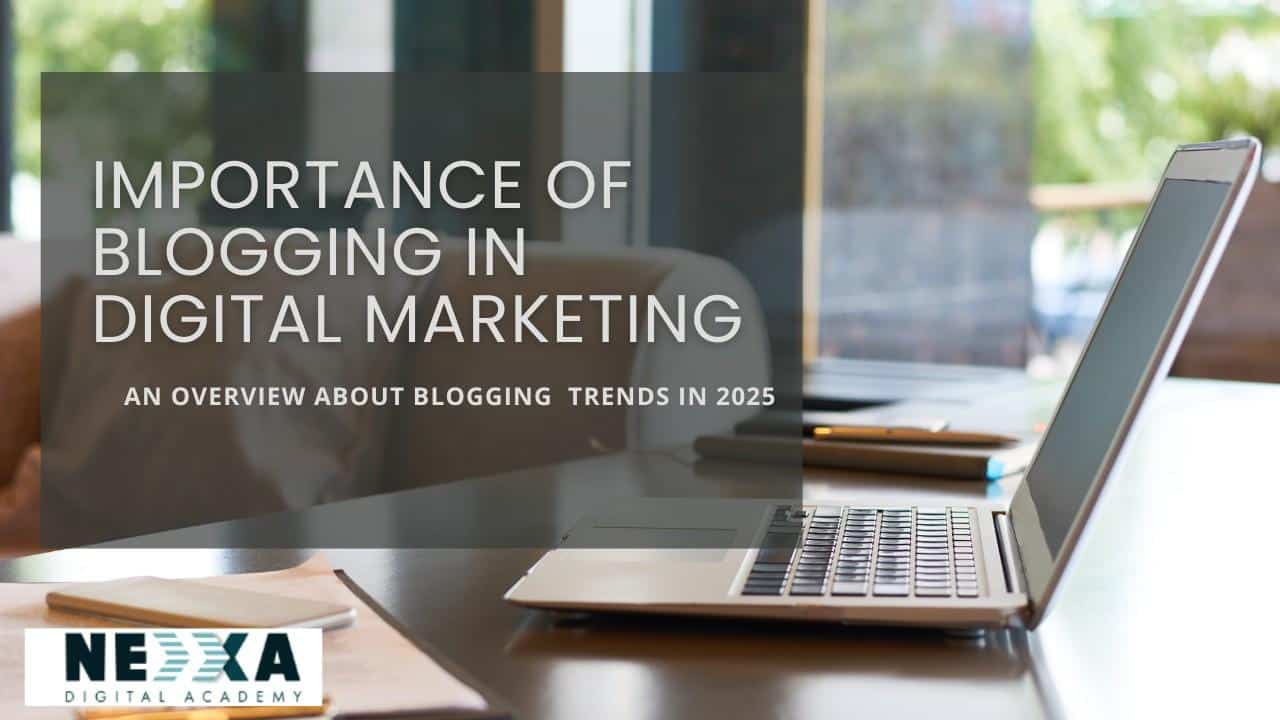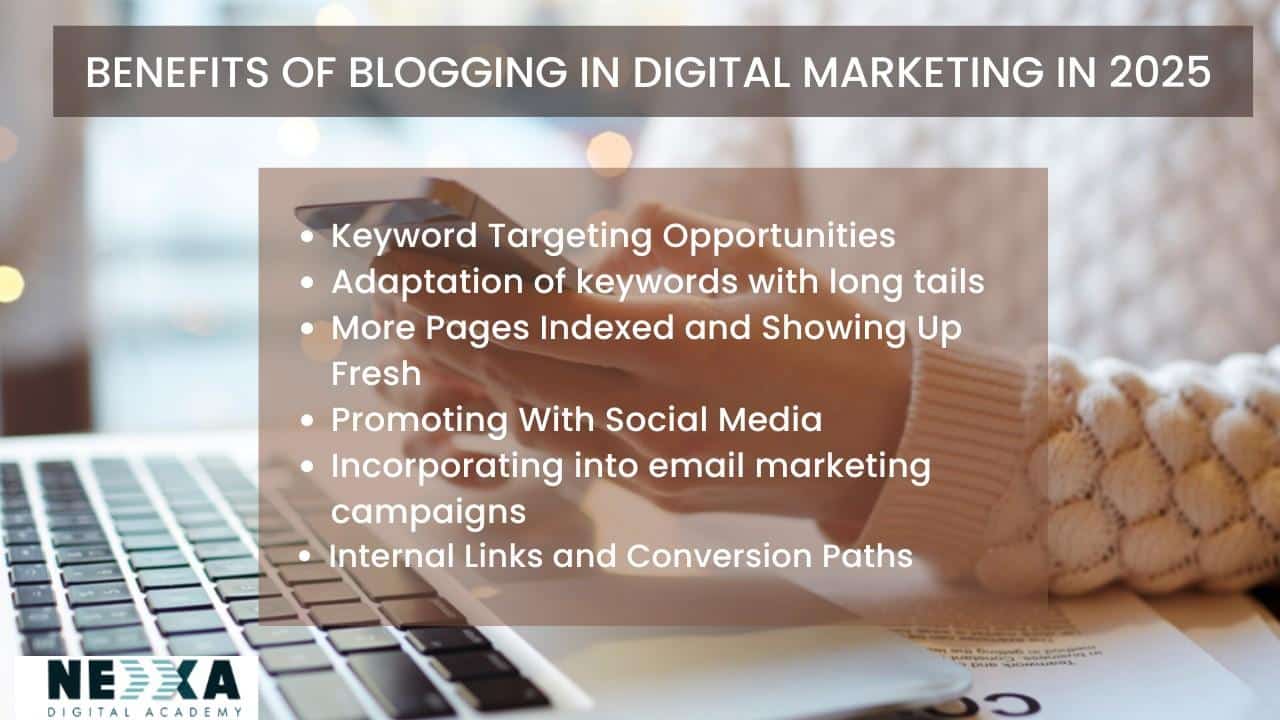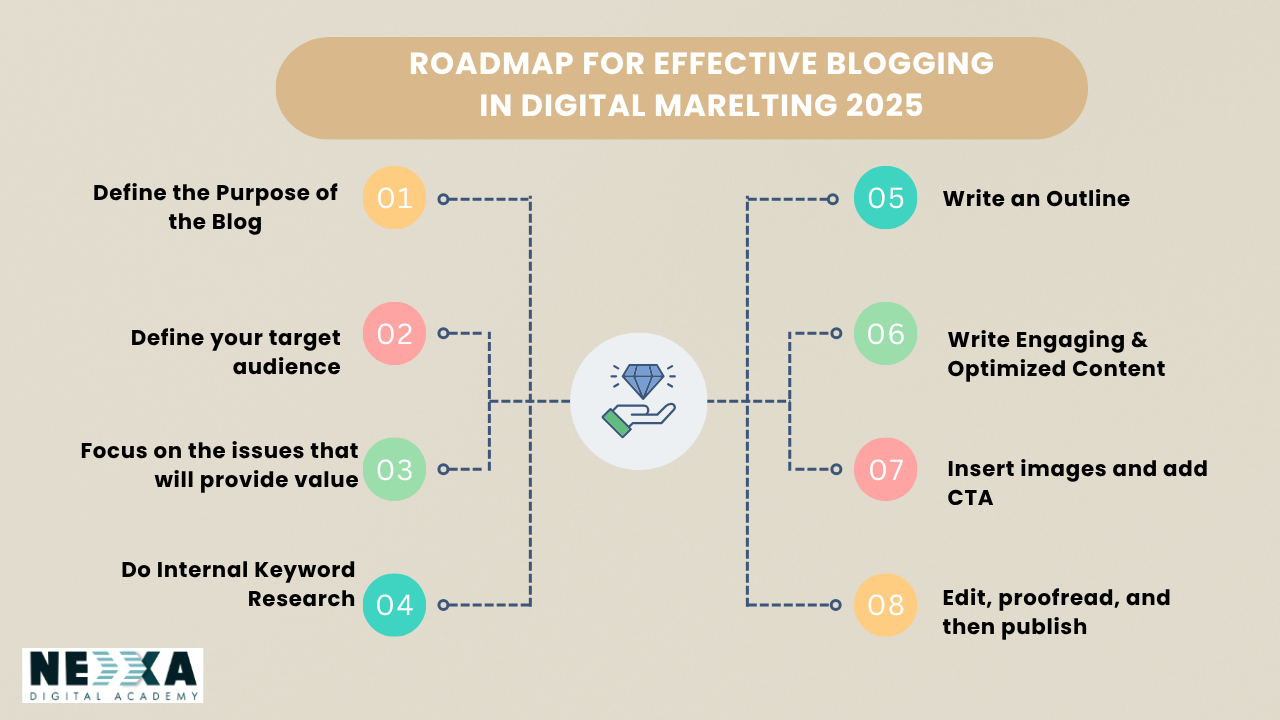IMPORTANCE OF STRATEGIC BLOGGING IN DIGITAL MARKETING 2025

Organizations are always looking for new or innovative touchpoints with their target audience, and blogging is an essential content marketing strategy that can build trust, drive traffic, and help convert leads into customers if it is conducted properly.
Blogging in digital marketing offers endless opportunities in which to develop influence, quality leads, and brand authority. Blogging has been, and still is, a very important piece of your marketing toolkit. Blogging generates organic traffic and effectively positions your brand as a credible voice. Simply put, if you don’t have a blog or a relevant, well-organized one, it’s another missing piece of your digital life.
What is Blogging in Digital Marketing?
Blogging in digital marketing is the intentional act of creating and publishing valuable, relevant, and consistent content on a website, called a blog. Blogging is a strong communication channel that hops between a business, organization, or individual and an audience of choice.
When you learn and become adept at digital marketing content writing for your blog and your content has identifiable digital marketing blog topics, you then have an operational website, not just a blog. A website with intentional content makes your brand a trusted and go-to information powerhouse, not just information-based but also connectively-based, that can facilitate results you can measure.
Why Blogging in Digital Marketing?
Here are four unique ways in which strategic blogging can give your brand a business advantage:
- Improves organic visibility
- Builds Authority and Trust
- Increases high-quality traffic
- Increases conversion rates
Role of Blogging in Digital Marketing

Blogging is more than just writing; it is a living, breathing expression of your brand that connects with your audience and brings attention to your brand faster than anything else you do on the Internet.
The Search Engine Optimization (SEO) Benefits of Blogging in Digital Marketing:
1. Keyword Targeting Opportunities: In regard to digital marketing blogging, it is essential to use keywords in an effective and precise manner in the blogging process so that it indicates to your audience (and search engines) important content points to the main theme of your digital marketing content writing. Potential new clients will understand that you can support them by being able to search for those phrases with those keywords.
2. Adaptation of keywords with long tails: Questions about the search engine are specific, usually long sentences. Blogs are great to help you rank for long-term keywords, and they usually attract quality traffic because of the explorer, especially the person they are looking for.
3. More Pages Indexed and Showing Up Fresh: New blogs also indicate to Google that your point is helpful and applicable. So as you publish new blog content, produce further indexable runners, increase your hunt ranking, and as digital marketing changes, it helps to keep your point fresh as well.
Blogging as a Customer Journey Guide:
1. Build Top-of-Funnel (TOFU) Awareness: Blogs are great for reaching new audiences (who are, essentially, doing research on a problem or topic) at the top of the funnel with content. As writers and marketers, we can either think of helpful articles that offer solution(s) OR valuable and actionable knowledge at this stage. Once we have made that differentiation, we can identify content writing topics for beginners.
2. Mid-of-off tunnel (MOFU) Consciousness: In the Mofu phase, you can start writing long guides and case studies, and the guide shows that you are experts in your field when you create trust and confidence through research and examples. Ingredients of writing quality in the digital marketing niche are very important here.
3. Help Convert Bottom-of-Funnel (BOFU) Customers: For those ready to make a decision, blogs can help seal the deal. Look for the right places to have a nice CTA in your blog post .
Integrating Links with Other Digital Marketing Platforms:
1. Promoting With Social Media: You are sitting on some great content to post on social media, and blog posts give good digital marketing blog topics to post on social.
2. Incorporating into email marketing campaigns: Linking to your new blog bulletins provides new content for your subscribers to engage with, reaffirms your authority, and gives them a reason to come back to your point. This is exactly what good digital marketing content writing accomplishes for you. It provides authority and makes it more likely for them to come back to your point.
3. Internal Links and Conversion Paths: When writing some blogs, use internal links that refer to other blogs or to product/service pages. This will strengthen the SEO of your point and lead visitors through a reading to a learning-to-conversion path. This multiple-layer approach is a benefit of blogging for digital marketing
Tips for Effective Digital Marketing Content Writing for Blogging
- Reader Personas: Go beyond demographics. What are their challenges? What do they want to learn? For example, a small business owner wants to know inexpensive tips, while a marketing student wants to learn the theory behind it. This will allow you to write digital marketing content.
- Enough jargon about the content already. Only speak to their needs. If they struggle with SEO, for example, give practical tips for digital marketing blog topic ideas when doing their keyword research.
- Are they informal? Are they professional? But remember it is important to keep consistent with those elements within your niche
Blogging as a Content Marketing Strategy
Blogs in the Content Funnel: A blog post can represent any stage in the funnel:
1. TOFU (Awareness): topics more general, like “What is Blogging in Digital Marketing?”
2. MOFU (Engagement): detailed guides, like “How to Improve Your Blog SEO.”
3. BOFU (Conversion): case studies that show the client’s business was able to improve their strategy and events in their journey of blogging in digital marketing.
4. Blogs vs. Formats: Blogs provide a good foundation for detail, SEO, and being discovered. Blogs often complement videos/podcasts by providing a more detailed written resource.
Types of Blog Content Used in Digital Marketing
The various types of content writing in blogging are as follows:
1. How-to Guides: Guide readers on starting effective blogs for digital marketing. Example: “How to Start Writing Blogs to Impact Digital Marketing.”
2. Case Studies: Highlight your successes and make case studies an attractive form of blog content.
3. Listicles/Tips: Listicles are an easy format for readers, and blogs like “5 Digital Marketing Blog Topics You Must Include” are enjoyable to write.
How to Start Writing Blogs for Digital Marketing Impact Now!

- Define the Purpose of the Blog: Clarify its mission to make sure every post effectively communicates and drives impact
- Define your audience: Define your target readers so every word hits home and connects.
- Focus on the issues that will provide value: issues that audiences are faced with.
- Do Internal Keyword Research: Know what terms your readers are searching for.
- Write an Outline: Organize your thoughts in a logical format.
- Write Engaging & Optimized Content: Make it easy to read with keywords, but only use them in a natural manner.
- Insert images: It results in better engagement and references.
- Add a CTA: Lead your audience to transition them from engaging to acting.
- Edit, proofread, and then publish: make it readable, correct errors, & share everywhere.
Believe it or not, if you can step through these processes, you will be able to turn your blogging in digital marketing into a strategic and tactical growth opportunity
Conclusion
Digital marketing in blogging is way more than writing on a page. When executing a plan strategically, blogging is one of the purposes of digital marketing that can be a tactical weapon in your arsenal to improve your brand awareness, visibility, authority, and return on investment. A blog will provide SEO rankings, help in the customer journey, and be the central hub of all your digital marketing content writing activities—and a brand should not skip blogging in digital marketing
FAQ
1.What does blogging as part of a digital marketing effort even mean?
Blogging as part of a digital marketing effort means that we are creating content that is informed, intelligent, and/or opinionated for a blog section on the project website. Blogging from a digital marketing perspective is one of the things that can help businesses, organizations, and individuals easily deliver value to their online audience while they are also achieving their marketing outcomes.
2. Why is blogging one of those tools in digital marketing that we can't do without today?
Blogging is one of those tools we can’t do without because it is the ancillary of influence, leads, and undeniable brand authority. Blogging in digital marketing creates a path for brands to interact and provide benefits to the readers and increase traffic to the site and create leads.
3. How does blogging in digital marketing benefit search engine optimization?
Blogging in digital marketing benefits SEO by long-tail keyword ranking and page indexing. New content indicates to Google that your website is active and relevant, and it is therefore more visible in the SERPs.
4. Can blogging in digital marketing be used at all stages of the content funnel?
Yes, blogging in digital marketing can be used in all stages of the content funnel, like TOFU, MOFU, and BOFU.
5. What are the methods by which blogging works with other digital marketing channels?
Blogging works well with all channels. A blog post can be highly promoted via social media, taken and utilized as important content in an email marketing campaign, and will provide internal linking, which is crucial, and can help users navigate internally towards conversion.
